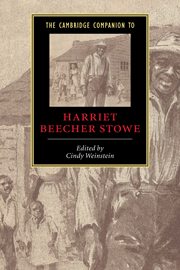Book contents
- Frontmatter
- Introduction
- 1 Stowe and race
- 2 Uncle Tom’s Cabin and the south
- 3 Uncle Tom’s Cabin and the American Renaissance
- 4 Reading and children:Uncle Tom’s Cabin and The Pearl of Orr’s Island
- 5 Uncle Tom and Harriet Beecher Stowe in England
- 6 Staging black insurrection: Dred on stage
- 7 Stowe and regionalism
- 8 Stowe and the law
- 9 Harriet Beecher Stowe and the American reform tradition
- 10 Harriet Beecher Stowe and the dream of the great American novel
- 11 Stowe and the literature of social change
- 12 The afterlife of Uncle Tom’s Cabin
- Select bibliography
- Index
- Series List
1 - Stowe and race
Published online by Cambridge University Press: 28 May 2006
- Frontmatter
- Introduction
- 1 Stowe and race
- 2 Uncle Tom’s Cabin and the south
- 3 Uncle Tom’s Cabin and the American Renaissance
- 4 Reading and children:Uncle Tom’s Cabin and The Pearl of Orr’s Island
- 5 Uncle Tom and Harriet Beecher Stowe in England
- 6 Staging black insurrection: Dred on stage
- 7 Stowe and regionalism
- 8 Stowe and the law
- 9 Harriet Beecher Stowe and the American reform tradition
- 10 Harriet Beecher Stowe and the dream of the great American novel
- 11 Stowe and the literature of social change
- 12 The afterlife of Uncle Tom’s Cabin
- Select bibliography
- Index
- Series List
Summary
In Robert Alexander's 1992 play, I Ain't Yo' Uncle: The New Jack Revisionist Uncle Tom's Cabin, Harriet Beecher Stowe's African-American characters accuse her of creating stereotypes and place her on trial.
George Harris delivers the main charge along with his verdict: “I find the accused - GUILTY!! . . . of writing stuff she couldn't possibly know about. A slave's experience. The black experience . . . my life here in America.” To make their case, the characters restage Stowe's story. They alter much of the dialogue, insert scenes, and rewrite their endings.
Restless in Canada, the escaped slave George returns to the United States at the head of the Black Thunder gang, whose mission is to free slaves and kill their masters.
Cassy, whose children have been sold and who has been the prisoner of Simon Legree for five long years (and in Alexander’s version, Legree does rape his newest acquisition, the young Emmeline), sees Legree beating Tom, aims a gun at him, and blows him away. This script change is too much for the manful George Harris, who yells “Cut,” demands to know “Who said the women get to shoot him?,” and summons Harriet, who insists that this is not the ending that she wrote. Cassy responds, powerfully: “You wrote every word of the rage that’s in me! You just didn’t give me a gun” (88).
Tom, listed in the dramatis personae as “a man with an image problem,” is transformed from an aggressively non-violent martyr into a figure resembling the protagonist’s grandfather in Ralph Ellison’s 1952 novel Invisible Man. Tom advises Topsy to follow a policy of strategic acquiescence with Miss Ophelia: “Let her think she’s teaching you sumpthin! You’ll have her eatin’ outcho’ hand like a heafer at feeding time” (51). With this scene, in which the irrepressible Tom counsels the young Topsy, Alexander brings the two characters together, which Stowe never does, thus rendering vivid this lacuna in Uncle Tom’s Cabin.
- Type
- Chapter
- Information
- The Cambridge Companion to Harriet Beecher Stowe , pp. 15 - 38Publisher: Cambridge University PressPrint publication year: 2004
- 5
- Cited by



